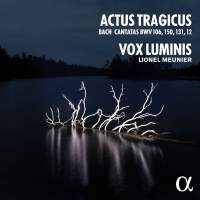Texte paru dans: / Appeared in: |
|
|
Appréciation d'ensemble / Overall evaluation :
|
|
|
Reviewer: Anna Picard
There are many beautiful
moments in this programme of four early cantatas by Bach. The mood is one of
rapt solemnity as we progress from Gottes Zeit ist die allerbeste Zeit (BWV
106), better known by its Buxtehudean soubriquet, Actus Tragicus, to the
lesser known Nach dir, Herr, verlanget mich (BWV 150), the sombre Aus der
Tiefen ruhe ich, Herr, zu dir (BWV 131), and the fractured lamentations of
Weinen, Klagen, Sorgen, Zagen (BWV 12), model for the Crucifixus in the B
minor Mass.
The seriousness with which Lionel
Meunier and Vox Luminis approach this work is evident, and the forces are ideal:
single voices amplified with a further quartet of singers as required; pale,
chaste recorders and mellow violas da gamba; single strings; sweet oboe and
slide trumpet; a fruity bassoon. But the articulation of the German text is too
often smudged, and the organ of Onze-lieve-vrouw en Sintleodegariuskerk in
Bornem, built by Dominique Thomas in 2013 after Gottfried Silbermann, dominates.
It’s a gorgeous instrument and may well be more authentic to Bach’s own
performing experience than the chamber organs we have grown accustomed to
hearing in ensembles of this size. The more animated vocalists can match its
vibrancy – soprano Kristen Witmer gives a bright and spirited ‘Doch bin und
bleibe ich vergnügt’ in BWV 150, bass Tomás Král an agile ‘Bestelle dein Haus’
in BWV 106 – but both tenor soloists are overwhelmed and the transparency of
Bach’s writing for recorder and gamba is obscured. | |
|
|
|
|
|
|
|
Cliquez l'un ou l'autre
bouton pour découvrir bien d'autres critiques de CD |
|




